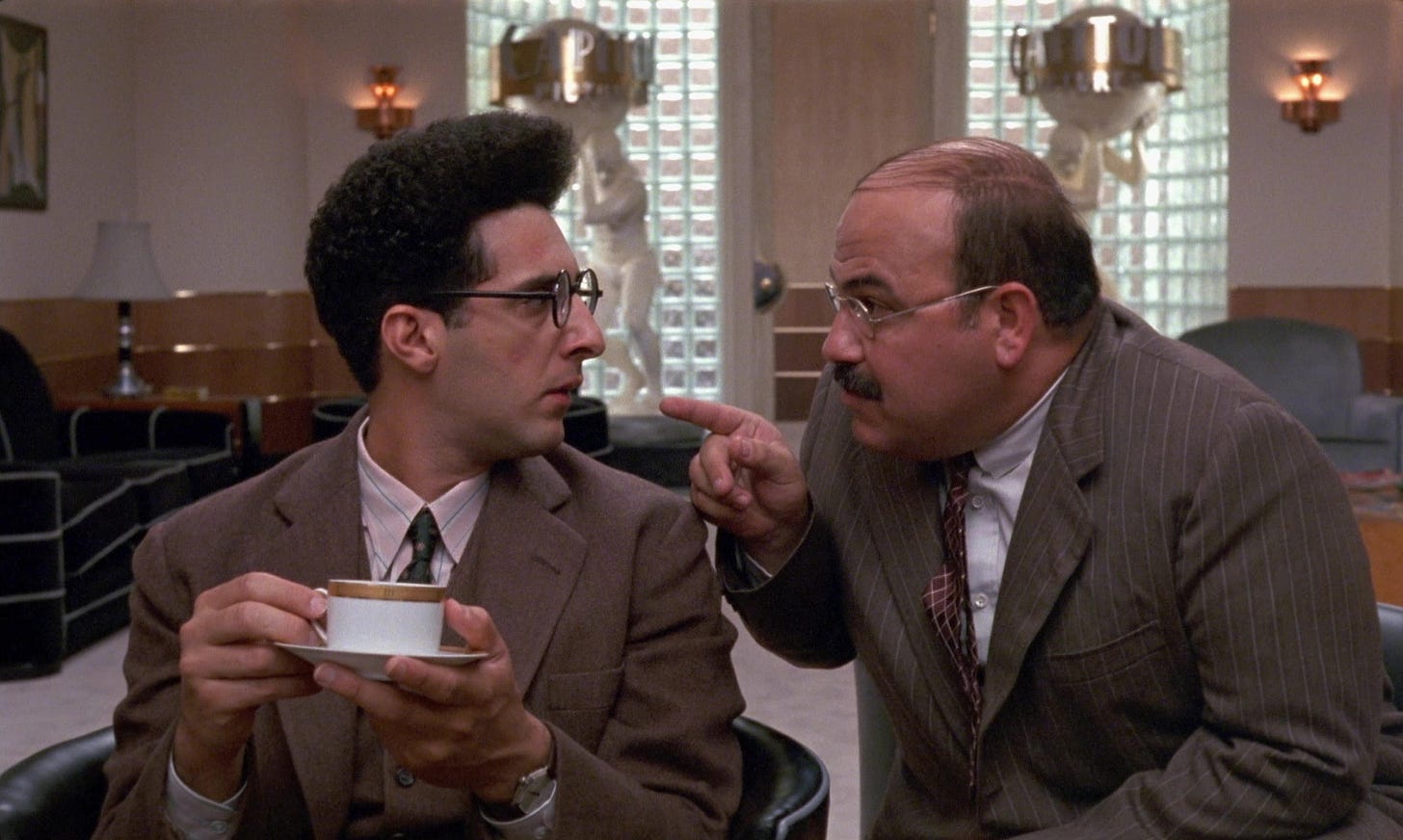How to take notes
and when to take them!
Hi Hollyweirdos! I’m still in the writers’ room for this series, and still pounding away at the keyboard before and after my work days to also write a feature. And sometime amidst all of that I have ALSO written for you this newsletter! Think about that! What generosity! What kindness!
Anyway… I had a very interesting question sent to me this past week, and wanted to share (with all of you) my answer and thoughts on it, because… it sort of gets at the core of the writing process. And if YOU ever have a question please let me know in the comments. And/or come to this Saturday’s Hollyweird Hang. More on that below.
But for now, the question: How do you process notes at a pitch stage from a director or producer that seem like they are asking you to change the whole concept of the project, especially if the notes come after everyone seemed to be on board before? How do you distinguish between whether this is a matter of mechanism/visuals by which the concept is conveyed or dramatized vs a true page zero reframe of the take? And how do you resist the urge to just give up? Thank you! — Anonymous!
I love this question. Many times I have gotten through nearly the entire pitch process of something that everyone feels really excited about only to then pitch it to their boss and their boss says… “I didn’t like it. I thought it was going to be different from that.” Then we are forced to as a team reckon with: should we try to change it all, or not?
So, first, Anonymous, I would take solace in the fact that this kind of waffling about the direction something could/should take is, unfortunately, very common.
In this particular instance, I would say… don’t get too down on it. Consider what you can and can’t salvage from the original pitch, and then… try to make the notes work. Especially if you need the money.
If you need the money the advice is almost always try to make it work.
Without knowing more about the specifics of the notes and the original pitch as conceived, it’s hard to say exactly whether the notes are in fact throwing everything out or not. But, when it comes to a pitch, I think it’s worth being pretty flexible. Even if you’ve spent dozens of hours on it, a pitch is still relatively short and relatively malleable in comparison with a script, which will end up taking hundreds or thousands of hours.
I would say that the average project that I have pitched on has taken somewhere between 3-6 months of process (at least) — first meeting, first pitch, a revised pitch (or two or three), then when everyone feels good, a pitch to the big boss. Then, if this is something you’re taking out to buyers, you’ll end up taking that finally approved pitch out for a new round of pitch meetings (to the actual buyers), which will also take time.
I’ve had processes where that all goes smoothly, and I’ve had processes where after one or two of those pitches we get feedback that makes us reconvene and change the pitch before we go into the next meetings. I’ve also had meetings where the buyers say “We don’t like it as conceived, but might like it if it were different and you pitched us that different version, do you want to do that?” So… blowing up the pitch is something that I would say you should expect to happen, and should expect to have some flexibility around. Even if it’s annoying. Especially if you need the money.
That’s my answer in this case. But the reason I really like this question is it sparks an even bigger question, which I wanted to write about!
How (and when) do you take notes?
I recently wrote about how to give notes, and felt I should at some point flip the tables and write about how to take them. Both are hard-earned skills that require a lot of practice, and a lot of emotional intelligence, and I don’t think either skill is taught particularly well.
So here’s my attempt to at least do a little bit of writing about it.
Write down why you’re writing the thing you’re writing.
Before you get notes, and before you even write the thing that you’ll later get notes on… it's good to know for yourself why you're writing it. Start With Why as the corporate self help book (which I actually think is a very good read for artists too) says. If you know where you are driving with a creative project, it's raison d'etre, that will save you a lot of headaches in sorting out notes throughout the process. That why will give you a lens through which to view all notes, and make it a heck of a lot easier to know what your internal compass is telling you. I’ve written about how to think about this before (here and here). It’s important stuff to know, and a mission statement will help you! I promise!
Listen to all the notes.
Something that helps when you are getting notes is to simply write them all down as you hear them. Even if you've also been sent the notes as a document, writing them all down will quiet the defensive part of your mind (or at the very least literally keep you quiet because you're too busy writing). This imperative because you do not want to get defensive. You want to hear all of the notes out. The good and the bad. You will discover as you jot down peoples notes into your own language that you are also translating and solving some of them as you write.
Do not get defensive. Or discouraged.
The process can feel personal. There's no way around that. You've spent hours, days, maybe even years writing this magnum opus (or piece of junk, depending on your mood) and here comes someone who has barely thought about it at all, and they’re pitching how they'd do it??? Don't think like this. Meet the feedback as though it is coming from the most generous place possible. Even if misguided (and more on that below) the notes are always an attempt at one thing: to make the best movie / tv show possible. Trust that people are coming to you with a generous spirit and meet that generosity with your own.
Feeling discouraged is the cousin of defensive. “I've spent all this time on this and I still can't get it right??? I'm sick and tired of this.” Well join the club! This is the process! If you're on the first draft you are almost certainly NOT YET DONE with the project. If you're on draft FIVE you're almost certainly not done! It takes many many many revisions to get to the place where it's perfect (and you're going to be doing them all the way through the edit and sound mix).
Let the notes settle.
Don't start implementing anything right away. Getting notes is like stirring up the silt at the bottom of a lake. You're agitating everything (emotionally and creatively) and even if you leave the notes feeling inspired and ready to go, you probably aren't yet seeing everything clearly. Let the notes settle in, returning to the bottom, so the water is clear.
Look back through the notes and organize them.
Sort the notes into three categories: Definitely, Maybe, No Way. I've also heard other writers describe this process as sorting them a bit differently, but it's the same idea -- 1) Useful and I agree 2) Counterproductive and I disagree. 3) Neutral.
The idea is to take all of the notes that feel actionable (and that you like) and to start to gather those together into the To Do pile and then take all of the notes you do not want to take and put them in a Not To Do pile. The neutral stuff becomes your bargaining chips. Can you do it without compromising your creative vision? Can you do it without compromising the quality of the film? Then maybe it's worth doing. Especially if it's a note from, say, the director, or the producer, or, the studio that's paying you.
Rewrite the movie.
You get it. Write yourself a “Work Order,” or a document detailing everything you're going to do (so that you can start crossing things off). You may also want/need to completely re-break the story, writing a new outline for yourself.
In general, start with the big stuff and slowly move on to the smaller scene and line notes. Otherwise you're going to waste a bunch of time fixing up that one scene that you end up later cutting completely when you totally rework the story. Big picture story stuff, then medium stuff, then small fixes. Trust me.
When to Take Notes vs. When to *Not* Take Notes.
This is the even thornier question! Not just HOW to do it, but WHEN to do it…
If it's your movie and you're writing it on spec and you don't like the note... you don't have to take it! But it is worth considering if you get it repeatedly, and it's especially worth considering if you have a suspicion they might be right (even if you don't like it).
You should always get notes from multiple people. Especially if it’s something you control and not an assignment! Notes are only as good as the brain they're coming from. And not everyone's brains will bump on the same things. Not everyone will have the same ideas or tastes and so it is imperative to get notes from multiple sources.
If it's a movie you are working on... whether a paid writing assignment or something that's a pitch to then hopefully convert into a paid writing assignment... it is very important to consider who the note is coming from. If it's for film and it's from someone attached to be the director... take the note. The director is in charge in film (sorry).
You do not have to take every note, but, in film, you are there to service their vision... so you'd better be able to get to the bottom of why they have the note they have, and then, if you do disagree, be able to articulate why you don't think that works for x,y,z reason. And the reason it wouldn't work better be backed up by the overall creative vision (the “why” I mentioned up top) of the project. If it's not... then maybe you need to try the note. Or at least try YOUR version of the note.
If the notes are on a pitch… producers and directors and attached talent tend to go a little bit crazy with notes. At a certain point (once it start to feel counterproductive, or like it's wheel spinning) you can and should point out to them... “this can all get figured out when we write the project.”
But, as I wrote above, I’ve personally practiced pitching and then revised and then practiced again with some projects over the course of months, and in the case of some TV pitch processes, even longer. So try to not get too defensive. And try to be realistic about your ability to push back on revisions.
Most importantly…. it’s good to remember there’s no RIGHT WAY to do anything. Trust your gut. Trust that the people you’re working with mean well. And trust that you can be honest about where you are in your creative process with them. If you’re absolutely fed up… sometimes it’s important to let people know that.
Have a question you want an answer to? I’d love to hear it! Leave it in the comments!
What else is going on in Hollyweird, you ask?
We have an upcoming, paid subscriber only, Hollyweird Hang TOMORROW at 1PM PT! You still have time to upgrade your subscription to join! Paid Hollyweirdos, I will be sending out the link tomorrow morning directly to your inboxes, so keep an eye out for that!
Warner Bros has joined the AI lawsuit battlefield. They’re suing Midjourney. This whole time I’ve been waiting for the studios’ insanely tight clutch on their own IP to be the thing that finally gums up the oncoming AI apocalypse. I personally think each and everyone one of these lawsuits is ultimately great news for creatives.
I’m really enjoying Platonic, Seth Rogen’s other show on Apple TV. Season Two is currently airing, and I only just recently watched Season One and… I like it! Fun!
Previously on… Hollyweird!







This is helpful. As a novelist new to screenwriting, I'm accustomed to going through years of complicated, often contradictory notes from editors, requiring wholesale revisions of hundreds of pages of writing...again and again and again. By comparison, I've found the screenwriting notes process fairly straightforward--more specific, clear, and actionable.
Novelists are expected to revise for years without compensation, all after being paid only the first 25% of the advance. Screenwriting seems to have a much better baked-in system of payments and deadlines.
I also just got into Platonic and was surprised by how much I love it given that I didn't even know season one existed until press for season two began. The visual intro of Seth Rogen's character as a guy who brings his own coffee in a travel mug to a meeting at Starbucks sold me and it only got funnier from there!